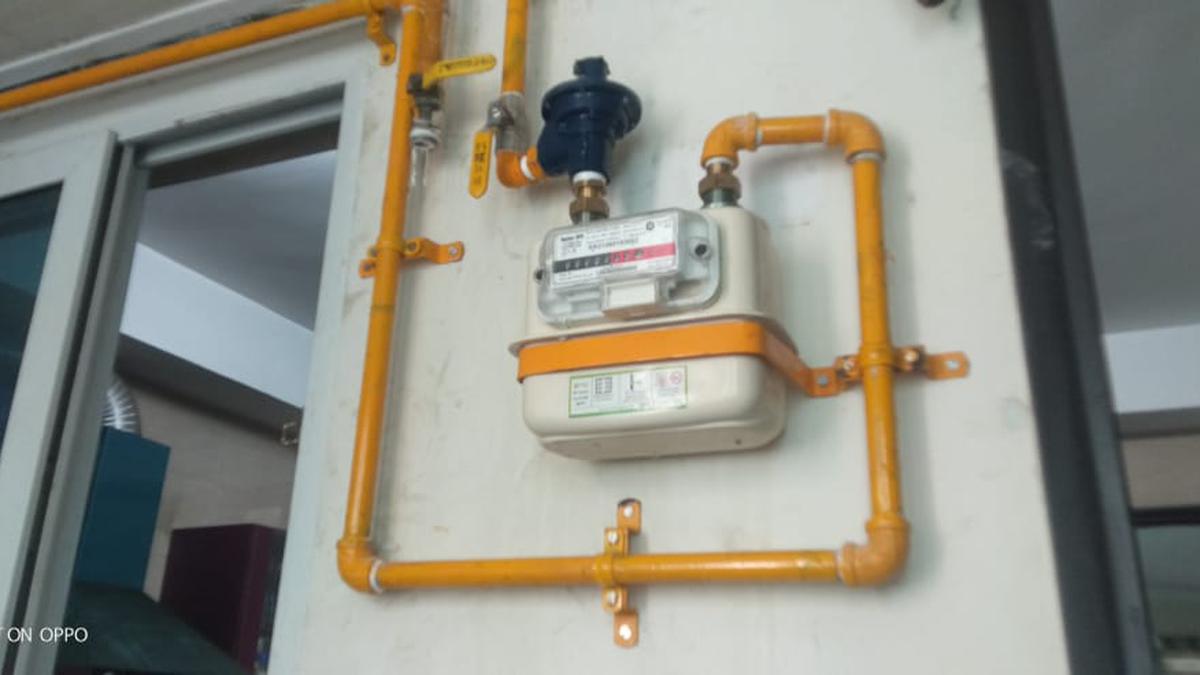
Trials on for Chennai’s first batch of piped natural gas connections to an apartment
The Hindu
Trial has begun at 55 houses at an apartment in Anna Nagar in Chennai for the supply of piped natural gas (PNG).
Trial has begun at 55 houses at an apartment in Anna Nagar in Chennai for the supply of piped natural gas (PNG). These are the first batch of domestic natural gas connections provided in the city. It has been over a month now since the trial run began with the company laying the pipelines at the 16-floor apartment.
Pradeep Sampath, a resident on the ninth floor of the complex, said that they were comfortable with the connection. “They refused to conceal the pipelines saying that it is a Government of India norm. With natural gas, we don’t have the issue of soot formation on the utensils,” he said.
R. Sitharthan, vice-president (Operations), Torrent Gas Chennai Pvt. Ltd., said that pipelines were laid wherever required. So far, over 3,000 registrations had been made in Chennai and those living in individual houses and apartments had evinced interest. “Since the price of Compressed Natural Gas (CNG) supplied via pipelines is lower than that of the LPG, more consumers are coming forward to sign up,” he said. Torrent is working on laying pipelines in Chennai, Tiruvallur, and Nagapattinam, where around 250 houses are using PNG as cooking fuel, and in Karaikal. The company supplies CNG to 65 fuel outlets.
Prakasam Jagan, chief executive officer, Chennai region, Ozone group, said the advantage with PNG was that the consumers received meter reading on WhatsApp. It is a safe fuel. Several apartment owners in the city had signed up for the connections, he added.
Indian Oil Corporation, which is laying pipelines in Coimbatore, Salem, Madurai, Thoothukudi and Krishnagiri, supplies CNG to 45 fuel outlets. It is laying pipelines for providing domestic connections.
AG&P Pratham, which is working in Kancheepuram, Chengalpattu, Vellore, Ranipet, Ramanthapuram and Tirupattur, has so far provided 361 active domestic connections and provided PNG connections to nine industries.

“Writing, in general, is a very solitary process,” says Yauvanika Chopra, Associate Director at The New India Foundation (NIF), which, earlier this year, announced the 12th edition of its NIF Book Fellowships for research and scholarship about Indian history after Independence. While authors, in general, are built for it, it can still get very lonely, says Chopra, pointing out that the fellowship’s community support is as valuable as the monetary benefits it offers. “There is a solid community of NIF fellows, trustees, language experts, jury members, all of whom are incredibly competent,” she says. “They really help make authors feel supported from manuscript to publication, so you never feel like you’re struggling through isolation.”

Several principals of government and private schools in Delhi on Tuesday said the Directorate of Education (DoE) circular from a day earlier, directing schools to conduct classes in ‘hybrid’ mode, had caused confusion regarding day-to-day operations as they did not know how many students would return to school from Wednesday and how would teachers instruct in two modes — online and in person — at once. The DoE circular on Monday had also stated that the option to “exercise online mode of education, wherever available, shall vest with the students and their guardians”. Several schoolteachers also expressed confusion regarding the DoE order. A government schoolteacher said he was unsure of how to cope with the resumption of physical classes, given that the order directing government offices to ensure that 50% of the employees work from home is still in place. On Monday, the Commission for Air Quality Management in the National Capital Region and Adjoining Areas (CAQM) had, on the orders of the Supreme Court, directed schools in Delhi-NCR to shift classes to the hybrid mode, following which the DoE had issued the circular. The court had urged the Centre’s pollution watchdog to consider restarting physical classes due to many students missing out on the mid-day meals and lacking the necessary means to attend classes online. The CAQM had, on November 20, asked schools in Delhi-NCR to shift to the online mode of teaching.









